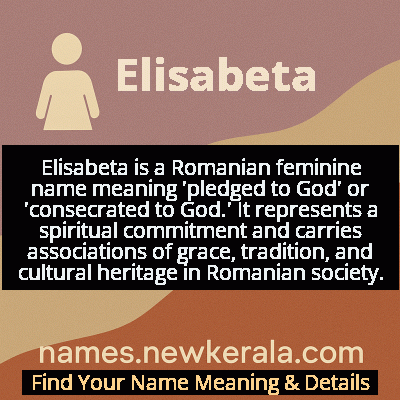Elisabeta Name Meaning & Details
Origin, Popularity, Numerology Analysis & Name Meaning of Elisabeta
Discover the origin, meaning, and cultural significance of the name ELISABETA. Delve into its historical roots and explore the lasting impact it has had on communities and traditions.
Name
Elisabeta
Gender
Female
Origin
Romanian
Lucky Number
2
Meaning of the Name - Elisabeta
Elisabeta is a Romanian feminine name meaning 'pledged to God' or 'consecrated to God.' It represents a spiritual commitment and carries associations of grace, tradition, and cultural heritage in Romanian society.
Elisabeta - Complete Numerology Analysis
Your Numerology Number
Based on Pythagorean Numerology System
Ruling Planet
Moon
Positive Nature
Diplomatic, friendly, artistic, empathetic.
Negative Traits
Over-sensitive, moody, indecisive, prone to self-pity.
Lucky Colours
Green, cream, white.
Lucky Days
Monday.
Lucky Stones
Pearl, moonstone.
Harmony Numbers
1, 3, 4.
Best Suited Professions
Diplomats, mediators, caregivers, artists.
What People Like About You
Cooperative spirit, friendliness, artistic talent.
Famous People Named Elisabeta
Elisabeta Rizea
Anti-communist resistance fighter
Symbol of Romanian resistance against communist oppression
Elisabeta Lipă
Olympic rower
Most decorated rower in Olympic history with 5 gold medals
Elisabeta of Wied
Queen of Romania
Cultural patron and writer who shaped Romanian national identity
Elisabeta Bostan
Film director
Pioneering Romanian filmmaker specializing in children's cinema
Name Variations & International Equivalents
Click on blue names to explore their detailed meanings. Gray names with will be available soon.
Cultural & Historical Significance
The name's religious dimension is equally important, as Romania remains one of the most devout Orthodox Christian nations in Europe. The meaning 'pledged to God' resonates with traditional values while also reflecting the historical role of women as moral and spiritual anchors in Romanian families. Throughout the 20th century, the name became associated with resistance and resilience, particularly through figures like Elisabeta Rizea, who embodied the struggle for freedom during the communist era. This combination of royal heritage, religious devotion, and national resilience makes Elisabeta a name that encapsulates key aspects of Romanian identity.
Extended Personality Analysis
Women named Elisabeta are typically perceived as possessing a natural dignity and intellectual depth that commands respect. They often exhibit a blend of traditional values and modern thinking, making them adaptable yet principled individuals. The name suggests someone who is both cultured and practical, able to appreciate art and literature while also demonstrating strong organizational skills and leadership capabilities. Their commitment to their word and responsibilities often makes them reliable partners in both personal and professional contexts.
Elisabetas tend to be excellent communicators with a gift for diplomacy and conflict resolution. They often show remarkable emotional intelligence, understanding others' perspectives while maintaining their own convictions. The name carries expectations of grace under pressure and the ability to handle complex situations with composure. Many Elisabetas develop strong interests in education, culture, or community service, seeing these as ways to fulfill the name's implied promise of meaningful contribution. Their combination of strength and sensitivity often makes them effective in roles that require both compassion and determination.
Modern Usage & Popularity
In contemporary Romania, Elisabeta maintains its status as a classic, sophisticated choice that conveys family tradition and cultural awareness. While it has been surpassed in popularity by shorter forms like Eliza and international variants, it continues to be chosen by parents seeking a name with historical depth and elegant resonance. The name is particularly favored among families with connections to Romanian history or those valuing the name's royal associations. Recent years have seen a mild resurgence of interest in traditional Romanian names, though Elisabeta remains a relatively uncommon choice, typically selected by urban, educated families who appreciate its cultural significance and timeless quality. Its usage patterns reflect a balance between honoring tradition and maintaining a distinctive identity in an era of globalized naming trends.
Symbolic & Spiritual Meanings
Symbolically, Elisabeta represents the ideal of devoted service combined with cultured refinement. The core meaning 'pledged to God' extends metaphorically to represent commitment to higher principles, whether spiritual, intellectual, or moral. The name symbolizes the bridge between personal faith and public service, suggesting that true strength comes from being anchored in meaningful values. It also represents cultural continuity - the passing down of traditions, knowledge, and ethical standards from one generation to the next.
In a broader sense, Elisabeta embodies the concept of graceful resilience, the ability to maintain one's dignity and principles through challenging circumstances. The name carries connotations of educated leadership and the idea that influence should be exercised with wisdom and compassion. It symbolizes the integration of Eastern Orthodox spirituality with Western cultural influences that characterizes much of Romanian history, making it a name that speaks to the country's unique position at the crossroads of European civilizations.

